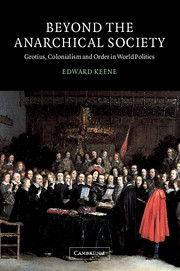Book contents
- Frontmatter
- Contents
- Preface
- Acknowledgements
- Introduction
- 1 The orthodox theory of order in world politics
- 2 The Grotian theory of the law of nations
- 3 Colonialism, imperialism and extra-European international politics
- 4 Two patterns of order in modern world politics: toleration and civilization
- 5 Order in contemporary world politics, global but divided
- Conclusion
- Bibliography
- Index
Conclusion
Published online by Cambridge University Press: 22 September 2009
- Frontmatter
- Contents
- Preface
- Acknowledgements
- Introduction
- 1 The orthodox theory of order in world politics
- 2 The Grotian theory of the law of nations
- 3 Colonialism, imperialism and extra-European international politics
- 4 Two patterns of order in modern world politics: toleration and civilization
- 5 Order in contemporary world politics, global but divided
- Conclusion
- Bibliography
- Index
Summary
The main critical point I have made in this book is that orthodox theories of order in modern world politics are inadequate because their analysis of the development of modern international order is too narrowly concentrated on the European states-system. While they have given some excellent descriptions of how that system operates, and especially how its members have collectively formed an international society based on the principle of respect for each other's sovereign equality and independence, orthodox theorists have almost completely ignored the way in which Europeans behaved beyond Europe, and therefore have failed to provide a proper analysis of the principles that have structured their relations with non-European peoples since the seventeenth century. Moreover, because they adopted a mistaken interpretation of the ‘Grotian tradition’ of international legal thought, and because their theory of the society of states is now popularly believed to represent that tradition, one of the principal examples of modern legal thinking about the characteristic features of international order beyond Europe has been cast into obscurity, making it much harder to recover a proper sense of what was going on in that part of the world.
The bulk of my argument has been devoted to trying to give an account of the pattern of international political and legal order that developed in the world beyond Europe, my goal being to supplement, rather than replace, the orthodox theory of order in the European states-system.
- Type
- Chapter
- Information
- Beyond the Anarchical SocietyGrotius, Colonialism and Order in World Politics, pp. 145 - 150Publisher: Cambridge University PressPrint publication year: 2002

